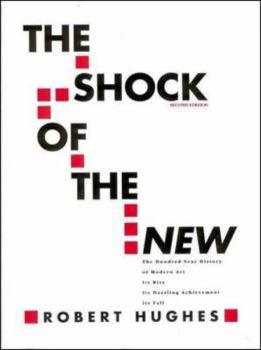The Shock of the New
Select Format
Select Condition 
Book Overview
A beautifully illustrated hundred-year history of modern art, from cubism to pop and avant-guard. More than 250 color photos. This description may be from another edition of this product.
Format:Paperback
Language:English
ISBN:0070311277
ISBN13:9780070311275
Release Date:September 1990
Publisher:McGraw-Hill Education
Length:444 Pages
Weight:3.28 lbs.
Dimensions:1.1" x 8.0" x 10.8"
Customer Reviews
5 ratings
The rise and fall of modernism
Published by Thriftbooks.com User , 22 years ago
This is based on the script for a BBC program. To be a good TV program, it should have a clear and plain storyline which could fit into limited timetable. You can identify such a feature in the form of book, though substantially enlarged. The author did his best to make a clear impression of what was modernism in the visual art on reader (and audience). The author begin the book with what modernist artists perceived as ¡®the new¡¯ in their time. They thought they lived in thoroughly distinct time from the tradition. The new age demanded the new art. Modernism is the logical upshot of their zeitgeist. To understand it, we should pay attention to the interaction between artists and the time. In this regard, Hughes organized the book not in time order or changing styles but with keywords which summarize the zeitgeist of modernists like machine, power, pleasure, utopia, freedom, popular culture, or future, to endow the reader with the tangible vision to see into the deep question of modernism.
More than an art book, by more than an art critic
Published by Thriftbooks.com User , 24 years ago
I bought and read the first edition of this book after seeing the 1979 PBS series Hughes hosted, and I heartily recommend both book (which I still have) and the TV show if you can find it anywhere. Hughes' special brilliance is his ability to show the revolution in art at the turn of the 20th century as reacting to the revolution in technology and living standards and the rapid changes in every part of society -- the "shock" of this race to "newnesss" that really starting picking up speed a hundred years ago. Also unique and priceless is Hughes' puckish sense of humor and willingness to express an opinion - even a negative opinion - about art and architectural movements.This is art history for the intelligent nonartist -- you will greatly enjoy it!
Valuable for the curious and the more experienced
Published by Thriftbooks.com User , 24 years ago
This is a famous art text and justly so. If you are wondering "just what is this modern art stuff?", this book will help you. If you are thinking "I don't know much about art but I know what I like" this book will surprise you with its magnificent colour plates and images. Robert Hughes can write reviews for the art glitterati, but he can also write for the average person with an interest in Modern Art, and very well he does it too!
Superb, sensible introduction to modern art for the curious
Published by Thriftbooks.com User , 25 years ago
Robert Hughes manages to do what no other contemporary critics can, see painting as a painter does, rather than as a writer--writing about painting. As someone who makes my living as a painter, I'm always frustrated by the clueless interpretations of art historians and especially critics. Often, they simply don't get it! They're looking for philosophic meaning in every nuance of a painting, when any honest painter would tell you, sometimes "It's just because it looked good like that!" I would highly recommend Mr. Hughes's book. It is a very sensible, insightful, and readable text. As a painter, I was very impressed by his observations and how he managed to communicate some idea of how painters actually create their work. (Critics would have you believe they start with a manifesto/theory/or other B.S. It's usually a lot less mysterious than that and Hughes does a great job of demystifying it. Also, it's a great book to show someone the purpose and value of art since 1900. Great Book!
One of the best writers writing on any subject
Published by Thriftbooks.com User , 27 years ago
Writers of fiction could go to school on Robert Hughes. In this book you run across description after description, phrase after phrase that prove the power of language while conveying the power of art, so many 'spot on' explications that one is left feeling nearly overwhelmed. Fittingly, language is at the center of one of his primary theses: That art invents the language that the world will then put into daily use. Shelley wrote that poets are the unacknowledged legislators of the world; Hughes might say that artists are their counterparts in the Supreme Court. Hughes is a stern, hard-boiled man, whose readings are based on clearest common sense. Even while he's transported by the beauty of a Frankenthaler, he has one eye open to make sure he's not being conned. He brooks no insincerity or unnecessary pomposity. His happens to be the only sensibility with the power to bring art to the masses, which is why it's appropriate Hughes is on television reaching out to the masses again in 1997. Dogmatism throughout will probably rub some artists the wrong way, but for the novice like me, it clears aside rhetoric and creates access. I came to modern art wondering why every museum displayed the same boring things; now I know why, and why it doesn't have to be so. This is the leaping-off point for which I've always been waiting.






